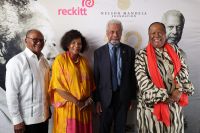
Outgoing Foundation Board Chair Njabulo Ndebele, Foundation Board member Futhi Mtoba, Prof Abdulrazak Gurnah and incoming Foundation Board Chair Naledi Pandor.
(Image: Nelson Mandela Foundation)Nobel Prize in Literature laureate Abdulrazak Gurnah spread a message of hope when he took the podium on Saturday, 28 September, to deliver the 22nd Nelson Mandela Annual Lecture in Johannesburg.
The Nelson Mandela Annual Lecture is celebrated worldwide as a platform for global leaders to address and propose solutions to the world’s most pressing challenges.
Leaning on his experience as an award-winning novelist, Gurnah praised “story, song and dance” for their ability to develop empathy between people – important if we are to realise our shared humanity.
“[S]tory, song and dance are, and have always been, [vital] to the very existence of a human community, not as ornaments or distraction, but as the acts that enable empathy and solidarity and self-recognition in a coeval atmosphere.
“Words will not end … injustices, will not rebuild schools or hospitals, or end detentions and the destruction of cities. But there are times when words is all we have, words and sympathy, and an understanding of our comparable experiences, our shared humanity.”
Gurnah described how, as a boy in Zanzibar in 1960s Tanganyika (now Tanzania), he first became aware of the anti-apartheid struggle in South Africa via stories.
“It was words that made it possible for me to have any real inkling of the experience of a South African. It was in the late 1960s that I first read the work of the many brilliant South African writers of that period. Peter Abrahams’ Mine Boy (1946) was a revelation in my teens, and there were so many others that came later, and afterwards became part of my work and my life.”
Stories, particularly those disseminated through literature, still have the power to change minds, Gurnah said. “Literature brings us news, it tells us about matters we did not know or from a perspective we had not considered before. That is what I had in mind when I mentioned a moment ago that it was words that gave me an inkling of South African realities. When I say news, I do not simply mean facts and information, but something that forces an engagement to the point of anguish.
Words are important, even when they are “all we have”, Gurnah said. “In the end, …words will not end this or other injustices, will not rebuild schools or hospitals, or end detentions and the destruction of cities. But there are times when words is all we have, words and sympathy, and an understanding of our comparable experiences, our shared humanity.”
After addressing the audience in the University of the Witwatersrand’s (Wits’) Linder Auditorium, Gurnah joined incoming Nelson Mandela Foundation CEO, Dr Mbongiseni Buthelezi in a dialogue unpacking the lecture theme, “Realising Our Shared Humanity”. Buthelezi, an academic whose most recent position was that of Associate Professor of Anthropology and Development Studies at the University of Johannesburg, takes the helm from acting CEO Verne Harris on 1 October.
Buthelezi, who studied Gurnah’s literature, asked the Nobel laureate how humanity can keep solidarity alive.
“By talking, by writing and by reading,” Gurnah said. “Words are the only way to keep truthfulness alive.”
Several dignitaries attended the event, including the newly appointed Chair of the Foundation Board, former Cabinet minister Dr Naledi Pandor, whose tenure also begins on 1 October.
Pandor’s appointment follows the retirement of Professor Njabulo Ndebele, who has served on the Board for a quarter of a century, and served as Chair for over a decade.
Gurnah, who is Emeritus Professor of English and Postcolonial Studies at the United Kingdom’s University of Kent, won the 2021 Nobel Prize in Literature “for his uncompromising and compassionate penetration of the effects of colonialism and the fate of the refugee in the gulf between cultures and continents.” This made him the first Black writer to receive the prize since 1993, when Toni Morrison won it, and the first writer from Africa since 2003, when South Africa’s JM Coetzee was the recipient.
Gurnah is the author of several books, including Paradise, By the Sea, Memory of Departure, Pilgrims Way, and Afterlives. His work has been nominated for the Booker Prize, the Whitbread Award, the Los Angeles Times Book Prize and the Commonwealth Writers' Prize.
Wits has hosted a number of the Nelson Mandela Annual Lectures. Mandela studied at the university during the 1940s as the only Black student in the School of Law at the time. At Wits, Nelson Mandela formed life-changing friendships with activists who fought alongside him against apartheid, defended him in court, and sacrificed their lives for the freedoms South Africans enjoy today.
While Mandela did not complete his law degree at Wits, in 1990 the university awarded him an honorary doctorate and, in 2004, the Wits Mandela Institute was established in the Wits School of Law in his honour.